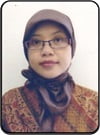Cooperative Learning Strategy for Improving Students’ Critical Reading Ability: A Case Study in English Study Program of Brawijaya University
Abstract
ABSTRACT: This study deals with a strategy named GD (Group Discussion) model of cooperative learning strategy applied in the teaching of critical reading course at English Study Program at the UNIBRAW (Brawijaya University) in Malang City, East Java, Indonesia. By using that strategy, it is expected that the problem in Critical Reading class can be solved and students’ ability in critical reading will, in turn, be improved. The design of the study is CAR (Classroom Action Research), since the study is aimed at improving the students’ critical reading ability and solving the classroom’s problems on the teaching of reading. Based on its characteristics, the CAR is done repeatedly until those problems can be solved. Dealing with the classroom setting, the study is directed to develop the teaching strategy in order to find out a solution to the classroom’s problem in the teaching of reading. This study reveals that cooperative learning strategy has successfully improved students’ critical reading ability. In doing so, there are stages conducted, namely: having cooperative work organization, using appropriate media, having creativity (for teachers), monitoring teaching and learning processes closely, and giving students feedback on their work. In conclusion, cooperative learning can be beneficial for students’ learning in critical reading as it can make students active and enjoy the classroom activities. However, it also has weaknesses, such as time consuming and less appropriate for classes with bigger number of students. Despite the weaknesses, teachers are still recommended to apply this strategy in Critical Reading classes.
KEY WORDS: Critical Reading; Students’ Ability; Cooperative Learning; Group Discussion; Classroom Action Research.


About the Authors: Emy Sudarwati and Yana Shanti Manipuspika are the Lecturers at the Study Program of English, Faculty of Humanities UNIBRAW (Brawijaya University) in Malang City, East Java, Indonesia. For academic interests, the authors can be contacted via e-mail at: yana.manipuspika@gmail.com
How to cite this article? Sudarwati, Emy & Yana Shanti Manipuspika. (2016). “Cooperative Learning Strategy for Improving Students’ Critical Reading Ability: A Case Study in English Study Program of Brawijaya University” in EDUCARE: International Journal for Educational Studies, Vol.9(1) August, pp.13-28. Bandung, Indonesia: Minda Masagi Press owned by ASPENSI, ISSN 1979-7877.
Chronicle of the article: Accepted (January 22, 2016); Revised (May 20, 2016); and Published (August 30, 2016).
Keywords
Full Text:
PDFReferences
Atabaki, Ali Mohammad Siahi, Narges Keshtiaray & Mohammad H. Yarmohammadian. (2015). “Scrutiny of Critical Thinking Concept” in International Education Studies, Vol.8, No.3. Available online also at: http://files.eric.ed.gov/fulltext/EJ1060910.pdf [accessed in Malang, Indonesia: October 9, 2015].
Ballone, Lena M. (2001). “Teachers’ Beliefs about Accommodating Students’ Learning Styles in Science Classes” in Electronic Journal of Science Education, Vol.6, No.2, December. Available online also at: http://wolfweb.unr.edu/homepage/crowther/ejse/balloneetal.pdf [accessed in Malang, Indonesia: November 10, 2015].
Barry, P. (2002). Beginning Theory: An Introduction to Literal and Cultural Theory. New York: Manchester University Press.
Bloom, B.S. et al. [eds]. (1956). Taxonomy of Educational Objectives, Handbook I: The Cognitive Domain. New York: David McKay Co, Inc.
Brown, H.D. (2001). Teaching by Principles: An Interactive Approach to Language Pedagogy. White Plains, NY: Addison Wesley Longman, Inc., fourth edition.
Burden, P.R. & D.M. Byrd. (1999). Methods for Effective Teaching. Needham Height: Allyn & Bacon.
Burns, P.C., B.D. Roe & E.P. Ross. (1996). Teaching Reading in Today’s Elementary School. Boston: Houghton Mifflin Company.
Chambers, B. & P.C. Abrami. (1991). “The Relationship between Student Team Learning Outcomes and Achievement: Causal Attributions and Affect” in Journal of Educational Psychology, 83, pp.140-146.
Davis, Kristina Lynn. (2012). “The Effect of Homogeneous Ability Grouping in Math Class on Student Achievement and Attitudes about Math”. Unpublished Master of Science Paper. Bozeman, Montana: Montana State University. Available online also at: http://scholarworks.montana.edu/xmlui/bitstream/handle [accessed in Malang, Indonesia: October 9, 2015].
Day, R.R. (2004). “Two Writing Activities for Extensive Reading” in English Teaching Forum. Vol.42, No.3, July.
Dishner, E.K., T.W. Bean & J.E. Readence [eds]. (1981). Reading in the Content Areas: Improving Classroom Instruction. Toronto: Kendall/Hunt.
Forster, M. & G. Masters. (1996). Assessment Resource Kit: Performances. Camberwell, Victoria: Australian Council for Educational Research.
Giesen, Leslie. (2001). “Activities for Integrating Reading and Writing in the Language Classroom”. Unpublished M.A. Thesis. Brattleboro, Vermont: School for International Training. Available online also at: http://digitalcollections.sit.edu/cgi/viewcontent.cgi?article=1422&context=ipp_collection [accessed in Malang, Indonesia: November 10, 2015].
Gronlund, E. Norman. (1981). Constructing Achievement Tests. New Jersey: Englewood Cliffs Prentice Hall, Inc.
Hattie, J.C. (2002). “Classroom Composition and Peer Effects” in International Journal of Educational Research, 37(5), pp.41-49. DOI:10.1016/S0883-0355(03)00015-6.
Interview with EA, a student, in Malang City, East Java, Indonesia, on 29 May 2015.
Interview with OS, a student, in Malang City, East Java, Indonesia, on 29 May 2015.
Interview with AA, a student, in Malang City, East Java, Indonesia, on 29 May 2015.
Interview with MN, a student, in Malang City, East Java, Indonesia, on 29 May 2015.
Jacobs, E. (1999). Cooperative Learning in Context: An Educational Innovation in Everyday Classrooms. Albany: SUNY [State University of New York] Press.
Johnson, D.W. & R.T. Johnson. (1994). Learning Together and Alone: Cooperative, Competitive, and Individualistic learning. Boston: Allyn and Bacon, 5th edition.
Johnson, B. & L.A. Turner. (2003). “Data Collection Strategies in Mixed Methods Research” in A. Tashakkori & C. Teddie [eds]. Handbook of Mixed Methods in Social and Behavioral Research. Thousand Oaks, CA: Sage, pp.297-319.
Kauerz, K. & J. Coffman. (2013). Framework for Planning, Implementing, and Evaluating PreK-3rd Grade Approaches. Seattle, WA: College of Education, University of Washington.
Kemmis, S. & R. McTaggart. (1988). The Action Research Planner. Victoria: Deakin University Press.
Kessler, C. [ed]. (1992). Cooperative Language Learning: A Teacher’s Resource Book. Englewood Cliffs: Prentice Hall, Inc.
Lai, Emily R. (2011). Motivation: A Literature Review. New York: Research Report, Pearson. Available online also at: http://images.pearsonassessments.com/images/tmrs/Motivation_Review_final.pdf [accessed in Malang, Indonesia: October 9, 2015].
Leo, S.L. (1994). Powerful Reading, Efficient Learning. New York: Macmillan Publishing Company.
Lie, A. (2002). Cooperative Learning: Mempraktikkan Cooperative Learning di Ruang-ruang Kelas. Jakarta: Grasindo, Translation.
Oakes, J.A., R. Gamoran & R.N. Page. (1992). “Curriculum Differentiation: Opportunities, Outcomes, and Meanings” in P.W. Jackson [ed]. Handbook of Research on Curriculum. Washington, D.C.: American Educational Research Association.
Okebukola, P.A. (1986). “The Influence of Preferred Learning Styles on Cooperative Learning in Science” in Science Education, 70, pp.509-517.
Pirozzi, Richard. (2003). Critical Reading, Critical Thinking. New York: Addison, Weasley Educational Publisher, Inc.
Rivers, W.M. (1981). Teaching Foreign Language Skills. Chicago: The University of Chicago Press, second edition.
Roe, Betty D. & Ellinor P. Ross. (1996). Developing Power in Reading. Dubuque, IA: Kendall/Hunt Publishing Company.
Ruslin. (2003). “Cooperative Learning in Teaching Reading Comprension at Third Year of MTs Sunan Kalijogo, Malang”. Unpublished Master Thesis. Malang: UM [Universitas Negeri Malang].
Sabarun. (2009). “Improving Paragraph Writing Ability of the Fourth Semester Students of the English Department of Palangka Raya State Islamic College Through Cooperative Learning Strategy” in Jurnal Studi Agama dan Masyarakat, Vol.3, No.1, Juni. Available online also at: http://e-journal.iain-palangkaraya.ac.id/index.php/jsam/article/viewfile/201/166 [accessed in Malang, Indonesia: November 10, 2015].
Scruggs, T.E. & M.A. Mastropieri. (2000). “The Effectiveness of Mnemonic Instruction for Students with Learning and Behavior Problems: An Update and Research Synthesis” in Journal of Behavioral Education, 10(2-3), pp.163-173.
Sharan, S. [ed]. (1999). Handbook of Cooperative Learning Methods. Westport: Praeger Publishers.
Skidell, M.B. & S.G. Becker. (2001). The Main Idea: Reading to Learn. USA [United States of America]: Pearson Education, Inc., third edition.
Slavin, R.E. (1995a). Cooperative Learning: Theory, Research, and Practice. Boston: Allyn and Bacon, second edition.
Slavin, R.E. (1995b). “Research on Cooperative Learning and Achievement: What We Know, What We Need to Know”. Available online at: https://pdfs.semanticscholar.org/8632/1d7266e116a1e8750aade319054a521c0639.pdf [accessed in Malang, Indonesia: November 10, 2015].
Slavin, R.E. (2002). Education Psychology: Theory into Practice. Boston, MA: Allyn and Bacon.
Soedarso. (2001). Speed Reading: Sistem Membaca Cepat dan Efektif. Jakarta: Gramedia Pustaka Utama.
Suharmanto.(2006). “Patterns of Relationship among Selected Factors Affecting the Students EFL Reading Comprehension”. Unpublished Doctoral Dissertation. Malang City: UNM [Universitas Negeri Malang].
“The Essentials of Argument”. Available online at: http://www.smcm.edu/writingcenter/wp-content/uploads/sites/48/2014/11/argue.pdf [accessed in Malang, Indonesia: October 9, 2015].
UNIBRAW [Universitas Brawijaya]. (2010). Pedoman Pendidikan: Program Bahasa dan Sastra, Universitas Brawijaya. Malang: Universitas Brawijaya Press.
Vygotsky, L.S. (1978). Mind in Society. Harvard: Harvard University Press.
Zintz, M.V. & Z.R. Maggart. (1984). The Reading Process, the Teacher, and the Learner. Dubuque, IA: W.M.C. Brown.
Zohrabi, Mohammad. (2013). “Mixed Method Research: Instruments, Validity, Reliability, and Reporting Findings” in Theory and Practice in Language Studies, Vol.3, No.2, February, pp.254-262. Available online also at: http://www.academypublication.com/issues/past/tpls/vol03/02/06.pdf [accessed in Malang, Indonesia: October 9, 2015].
EDUCARE: International Journal for Educational Studies. Ciptaan disebarluaskan di bawah Lisensi Creative Commons Atribusi-BerbagiSerupa 4.0 Internasional
